We discussed how David Lynch, CEO of software company Klir, said the world's first trillionaire will be a water entrepreneur. Most of us probably thought it would be in fintech or IT or maybe some flashy Tech startup… Well, EVERYONE needs clean water! But how do we SCALE DOWN the technology that people need and make it widely available enough to get the job done? Find out in the replay!
Transcript from recording
Opening
Ken: Hi, I'm Ken Berenger coming to you from the Nasdaq market site in the heart of Times Square. If you're an accredited investor and the idea of being in front of billions of dollars of pre-market money ahead of an asset class that has $1 trillion existing market, if that's not for you, keep scrolling to the next ad, But if it is for you, come inside the studio and I'll tell you more.
What can we be involved in that can really grow and protect us in the future? Well, look, here's the facts. While we were out selling before the next bubble popped, $1 trillion market was being eyed by professional money. Now that market is water. Now water, think about it, as a commodity. If it's done right, it could trigger the biggest wealth creation event of our lifetime. Now we think water on demand can do just that.
So here's what it comes down to. If you're an accredited investor and you would like pre IPO pre institutional pre smart money and you want to find out more how that could work for you, I want you to click the link below and go to oc.gold/callken. Now if being ahead of the big money, if being ahead of the smart money isn't your cup of tea, scroll to the next ad.
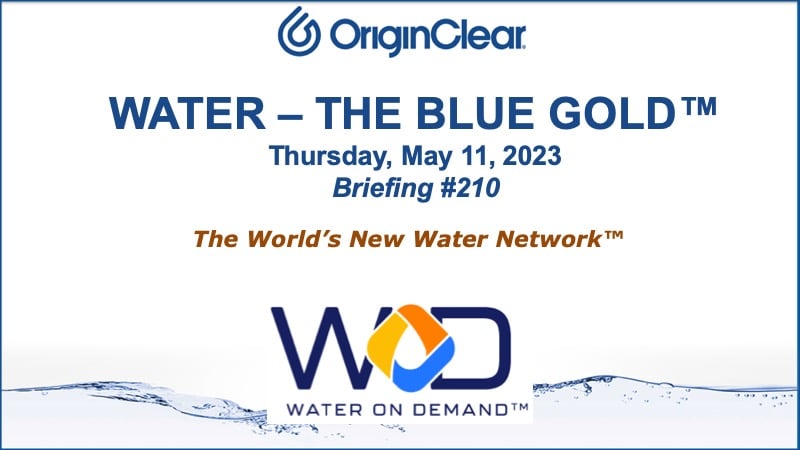
Introduction
Riggs: Well, I'm just going to scroll to the next ad, That's it. I'm going to scroll the next ad, because that was a good video. I enjoyed that video. I actually thought it really made the point clearly and crisply what we've been saying all along. So good job there with Ken in New York last month. And of course, there's more to come. You see that?
Ken: I was in New York five minutes and I had a bad attitude already. I was back for five minutes.
Riggs: What are you talking bad attitude? Good attitude.
Ken: Big attitude. How's that?
Riggs: There you go. All right. Thursday, May 11th, and it is briefing number 211 The World's New Water Network.
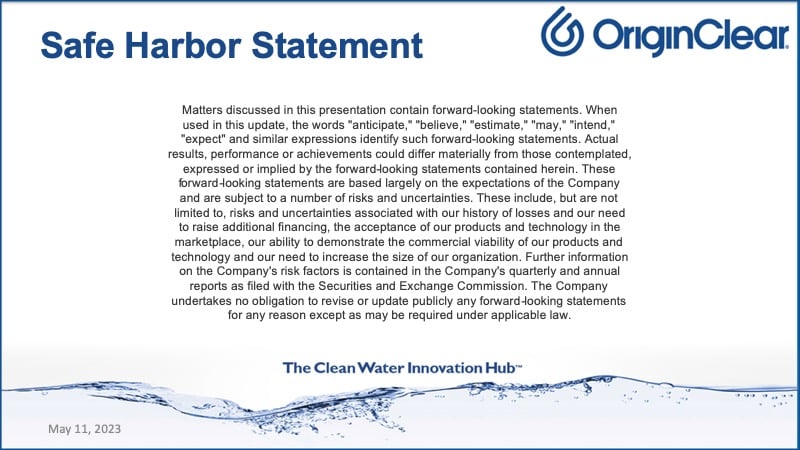
And the usual disclaimers.
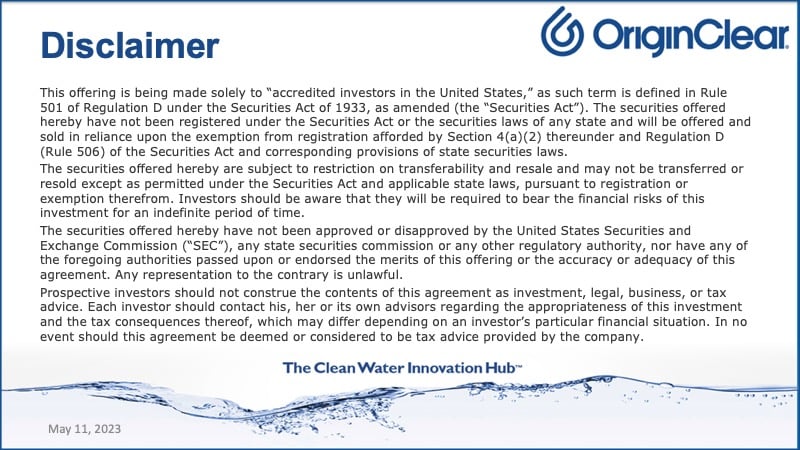
News
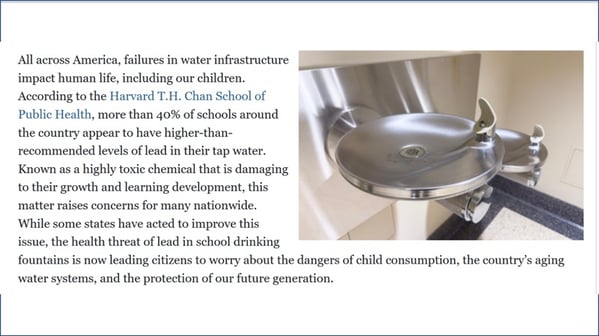
Water Online
So we got into the news on wateronline, which is the leading water trade. And this is some good positioning because the problem is, of course, that, you know, the media is all about consumers. So they're focused on people and we're focused on business. So how do you make the two work? So this is actually pretty well done, I thought. So how can we fix the nationwide problem of lead poisoning? It talks a little bit about how lead is damaging to growth and learning development. Et cetera. Et cetera.
Quality
And then it gets into our point of view where I talk about how most states have D and F grades. And really, it's a scandal. So the lead exposure is bad. There's no safe level of lead in a child's blood, period. Now you can get the lead out of people's bodies, but it's difficult. And most people don't know how. It basically consists of getting all your minerals out. And then you have to replace the minerals. It's, you don't want to try this at home. So the bottom line is don't get the lead into your body in the first place. Learning behavior issues, nervous system issues, slowed growth, lowered IQ.
Underfunding
And then we have also the problem with underfunded infrastructure, which we've been saying for a while now, which because of the way the system is built, the least wealthy communities are at the end of the line and they get the worst water, including higher blood lead levels. That is a scandal,
Lead in Pipes
Obviously. Recognize the problem. We need point of view solutions. In other words, filter, have the filtering right there. Unfortunately, the lead is in the pipes. It's a done deal. So then have filters that, when people drink the water at home. Et cetera. You can send kids to school with filtration. Et cetera. And then we talked a little bit about how we can help by actually helping businesses treat their water right where it's made dirty, reduce the burden on central systems. So this was a very good policy piece in, as I said, the nation's number one water trade. James Wright says, "That is our we get stuff done no BS attitude." Right on.
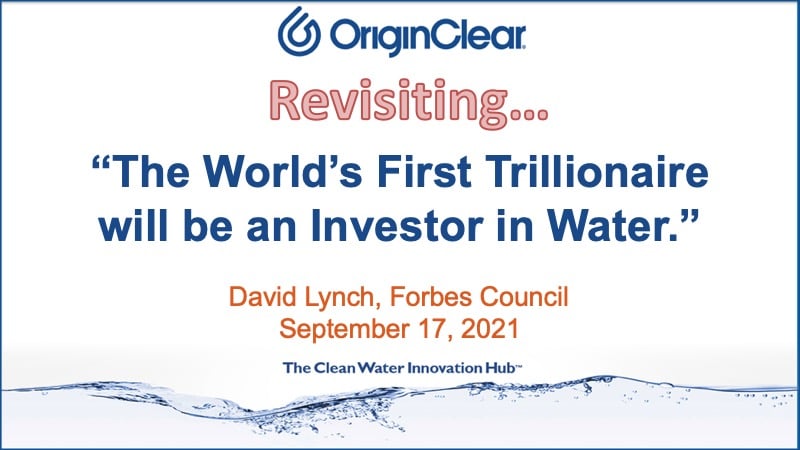
Back in 2021 this was a very good article and we're revisiting it now. The world's first trillionaire will be an investor in water. All right. What are we talking about here? It basically the story is that Kara Swisher in 2020 said that the world's first trillionaires will be a green tech entrepreneur. The CEO of KLIR, David Lynch, says actually it won't be in the space. E-commerce, information tech or fintech. It'll be in water. He, of course, is a software guy, so that's what he's about.
Combining Fintech and Aquatech
But let me point this out, that we are actually combining water and fintech and to a certain extent, information technology in one package. So how does this work? Well, first of all, he makes a very good point that people think you can just solve, you know, infrastructure upgrade. Et cetera. The problem is, as we know, number one, is not enough investment in the central systems, which means what do you do? Meanwhile, venture capitalists have been focused on shiny, cool stuff, you know, environmental, social governance, infrastructure upgrades. Et cetera. Which are not enough.
Funding Infrastructure
Now, here it says, VCs are poised to lead the witness here with investments in SaaS oriented software as a service oriented ventures, which is a great idea. And so what he's really pushing is software powered solutions, which actually we're totally in favor of. I'll talk to you about that in a second. But the bottom line is, and this is very important to understand, is the world is starting to recognize that the funding infrastructure in place to invest in software and technology ventures, as well as flashy climate tech startups can be applied to water.
And of course, there's all kinds of best practices on how to do it. And he makes a very good point that it's very regulated and fragmented. So, again, what do you do about it? Well, you know, how do you unite it? That's the problem, Right. And so there is an opportunity here, according to Lynch, that we're shifting into a better market. And part of this is decarbonization, which to my mind, is a complication for water. Already we're trying to get the clean water and now we're trying to get sustainable.
The good news is that when you do treat the water at the point of use, you are actually saving on greenhouse gases. We did the case study a few years ago around that hotel installation and we showed how that was so, with the numbers. Very good case study by Dan Early.
Strategic Investments
Well, here we go. The world's first trillionaire might have strategic and early investments in water innovation to thank for it. They might invest in water's first unicorn or lead that company to its illustrious position as a founder, board member or C-suite. What our position is that we're less interested in making a trillionaire. We're interested in a group, a tight group of incredibly dedicated investors who are working together and who will share in these benefits.
Believe me, when you're talking about $1 trillion, that breaks down into a lot of billions, not a problem. I've always felt that way. Bob Roos says, "Riggs, are you planning on being that trillionaire?" Actually, no. I'm, I personally like to share. The people in my company know that we have a restricted stock plan that our funders have told me, "Riggs, just take care of yourself."
Well, actually, the way I did it is every single person in the company has the restricted employee shares. And that's how I like to do it, because I like to have people come along with us. And Robert Baxter is doing the math for us. 1000 billion. Indeed it is. Lots of billionaires.
Ken: 1000 billionaires, yep.
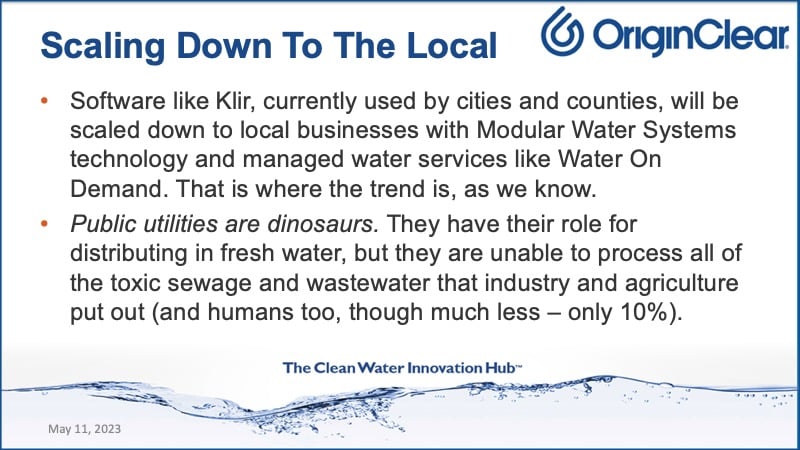
Riggs: Lots of billions. All right. Here's our commentary. So it's all about scaling down software like KLIR, which is this guy Lynch, will be scaled down to local businesses. And that's where the trend is. Public utilities are dinosaurs. They have their role. Absolutely. We don't want to replace them and distributing fresh water, but they can't process all that toxic sewage. And that is choking us and creating incredible public health problems, most of it from industry and agriculture.
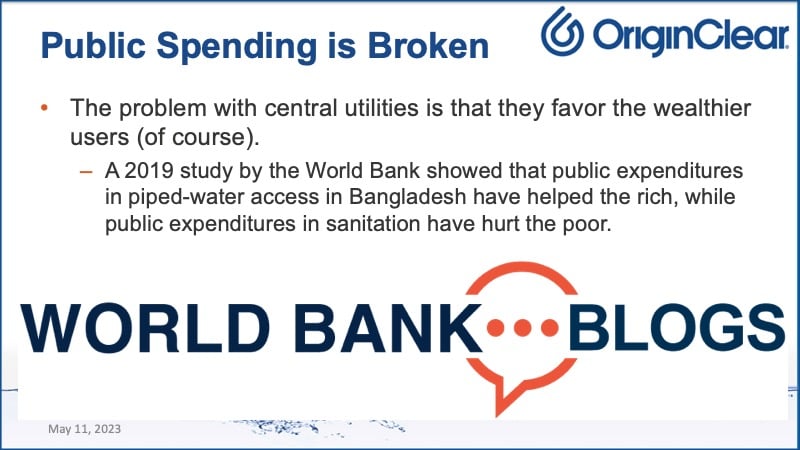
Water Access
World Bank. This, isn't always about the wealthy. Central utilities favor the wealthier users. And here it is. The piped water access helped the poor. As you can see, the bottom 40% got improved water supply. The top 60 got more piped in water. So yeah, they did better. And then also improved sanitation literally almost doubled between the bottom 40 and and top 60. That is a problem. So they get better water and they get better sanitation. This is the problem with the centrally planned water system.
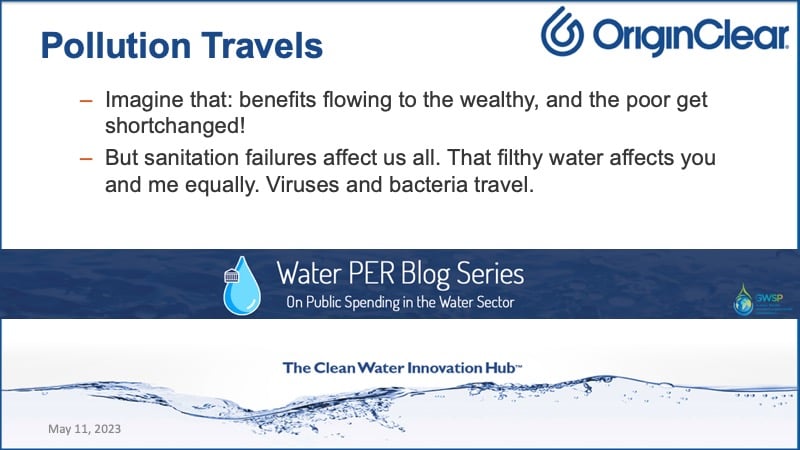
Imagine that benefits flowing to the wealthy and the poor get shortchanged. Sanitation failures affect us all and we know that you can't control your aquifer. Your aquifer hits you everywhere.
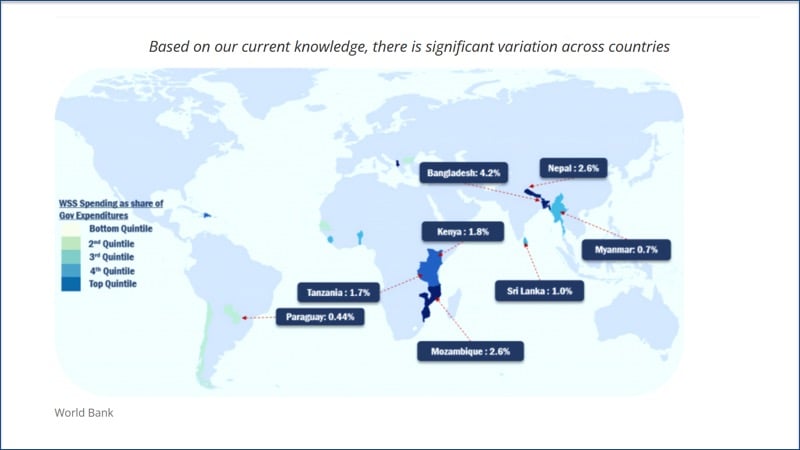
Now, here's what's interesting, and this reinforces our point of view. Again, this is the percentage of wastewater spending as a share of government expenditures. And look at this. Paraguay, less than 1%, Mozambique 2.6%, Sri Lanka, 1% of government expenditures. This is not a pretty picture.
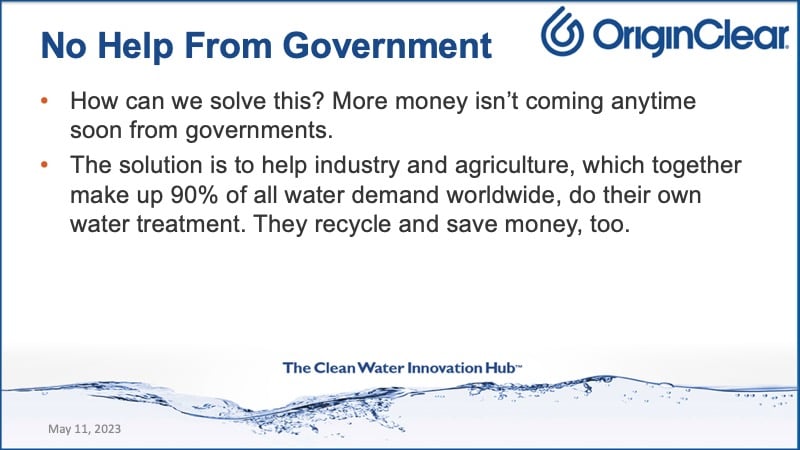
The Issue
Now, here's the issue. More money isn't coming anytime soon from governments. Solution, then is to help industry and agriculture do their own water treatment. This is our solution. It's elegant, it works. When you look at it, it's the only solution.
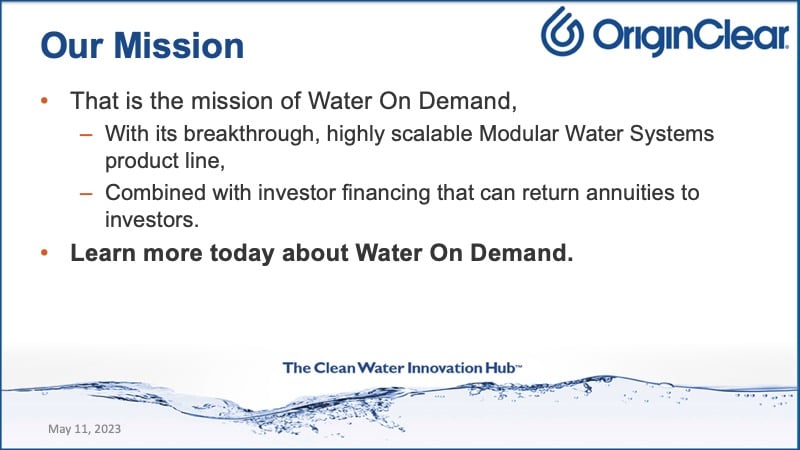
The Model
Our mission is, first of all, we are a breakthrough, highly scalable Modular Water Systems product line combined with investor financing that can return annuities to investors. That is the model. It's clean, it's simple, it's equitable. And that's Water On Demand.

Spotlight on Africa
In order to give you an idea of the scale of the problem, I thought I would zoom in on Africa. I also wanted to do India, but that'd be a whole other CEO briefing. Perhaps I'll cover it in another one. Let's take a look at this.
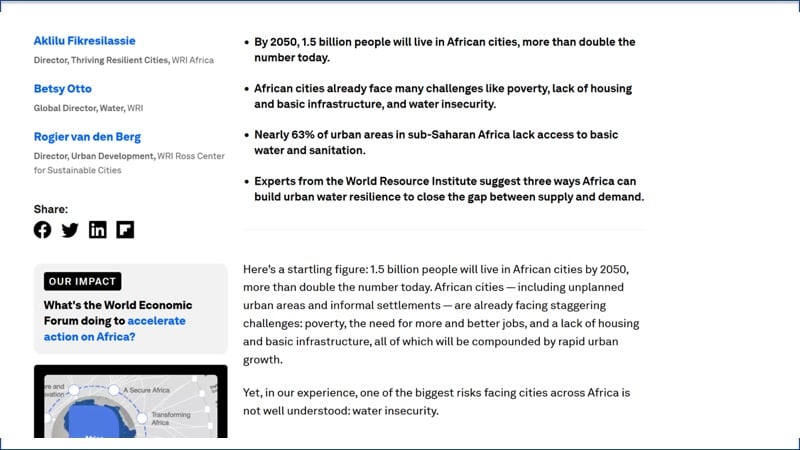
Water Insecurity
This was the World Economic Forum working with the World Resource Institute. And here's the thing. 1.5 billion people more than double by 2050. They are racing like literally in 27 years, we're going to double the number. Nearly 63% lack access to basic water and sanitation. So it's pretty horrendous what's going on here. And it's an unstoppable situation. So we have water insecurity.
We see 60% of Africa's urban dwellers live in slums. Most of the inhabitants, for example, in this town of Diredawa, have no access to clean water. This is, you know, almost incomprehensible for us in the first world. Now, here, look, most cities in Africa are yet to be built. This opens the potential to bypass traditional and flexible approaches and instead adapt more flexible and circular water sensitive designs.
So this is where we start to look at, hey, we've talked before about how there's going to be deglobalization bringing industry back to North America as it does, water treatment will be integrated with the factories, the state of the art factories that are already being built south of the border. Well, this is what's going to have to happen in places like India is that cities are going to have to have integrated water handling and water treatment. Keith Roeten, "Dadgum those numbers in Africa are scary." They are indeed.
This goes on to talk about how less than 25% of the urban population has access to safely managed water. This is in 2019, and only 42% have access to safe sanitation services. This is killing people. That's the problem.
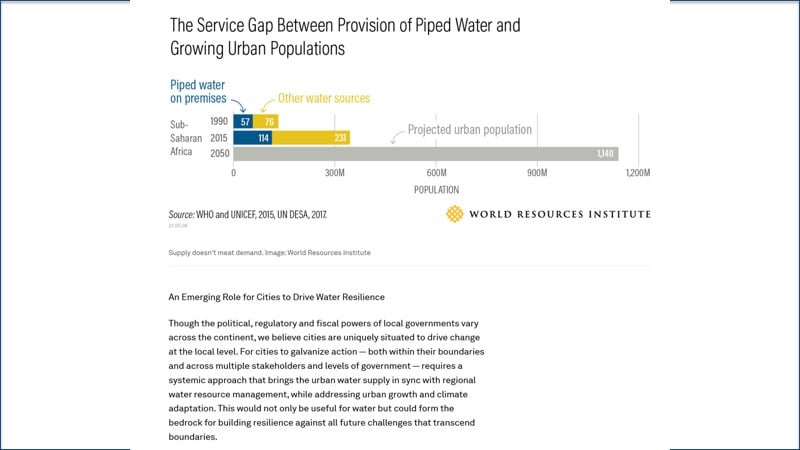
Service Gap
Take a look at these numbers. Take a look at the urban population and take a look at the gap. We've been talking we've been yelling about how infrastructure spending isn't keeping up. There is that graph. Look at 1990, 2015, and by 2050, look, we're at a billion and 140 and it just eclipses the whole thing. So we have a problem. Supply doesn't meet demand again. We've been saying again and again that things cannot be done essentially because you just can't keep up.
So, for example, water management is managed by a plethora of industries and of course there's lots of corruption as usual. Interestingly enough, the. JP Morgan in Manhattan started out as a water company and they found it easier to lend money instead. So it gives you an idea of how hard it is to make water work at the infrastructure level. All right.
Change how cities are built. Again, use decentralization as the tool, just like how we did landlines in Africa where we didn't put in big central infrastructure. We just made it towers and and smartphones. That's how it goes. And so we can work on things like water conservation, which that's a really good central thing to do channeling water, etcetera. Absolutely. There's no question that that central work has to happen. But treat the water. Treat the water well.
Combination of engineered solutions with making nature work for you. Those of you who live in Los Angeles know that we've moved from these giant concrete waterways that are designed to channel the water into the ocean to a more absorbing model where the water gets absorbed locally. It's actually far better. That's the kind of thing we're talking about.
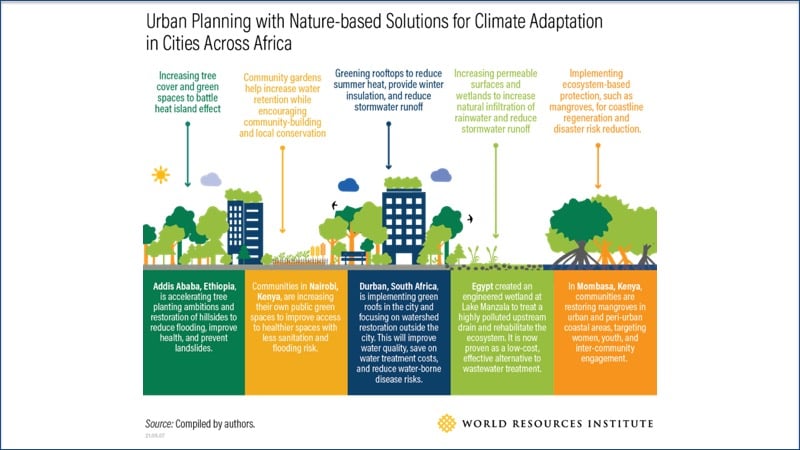
Solutions
And so we get these various ideas. These are things that are happening more tree planting, more green spaces, green roofs, wetlands and restoring mangroves in coastal areas. These are all wonderful ideas. We still have the filthy sewage water to deal with, and that still has to happen, we believe, right, where people make it dirty. So great ideas. These are fantastic. The problem is, of course, that is a I'm going to say a drop in the bucket.
Uh, this is a great article, but it's long. I'm not going to keep giving you a hard time. But think about this. Residents of Mukawa and this is, again, where the poor gets really shafted. They pay almost double for water than the people receiving piped water. So we have to move to water pipelines from trucking. Again, that is something that the cities can do. We do believe that the drinking water and the management of flood waters and so forth, that is really good job for the cities.
Responsible Stewardship
Managing the Blackwater is something that has got to happen right where it is made dirty because that is the source of the disease. That's how we get 6000 kids a day dying and so forth. It is this problem of toxic water. And Ken and I run into this all the time. People are like, oh, it's all about the water coming from the Colorado River. Yeah, yeah, yeah, yeah. Water's coming in. There's droughts and so forth. But you've got to take care of the water and not just throw it away dirty. Because if you treat it properly and you recycle it now, you relieve the droughts, but you're also being a good steward. And we believe that is not going to happen at the central level. Keith wants are we going to lobby that all new development areas of housing be decentralized? This is how.
Okay, this is a really, really good question, Keith. What we're doing here, 25 years ago, Dan Early was preaching in the desert. He was a prophet of decentralized water. Nobody was listening to him, and he just worked on it and worked on it and worked on it. 2018 we we recruited him to become part of because we saw the future of decentralized water treatment. And he is constantly doing webinars. He's evangelizing to consulting engineers right on the ground. So the lobbying happens right there where an end user goes, I have a problem with such and such, and the engineer goes, Why don't you use a Modular Water System?
All you got to do is put down a pad and pipe in water and they'll come with the thing drop, drop it in place, plug it in. Six hours later, you're up and running. You saw that coverage of the system. We put it in place in Moscow, Pennsylvania. So that's how it happens. It happens not by, you know, going to Sacramento and spending, you know, lots of money buying people off. It's done by showing how it's done on the ground and then increasingly being adopted.
For example, we're working with a nonprofit that is in Texas that is doing tiny homes as a solution for a homelessness. Well, they adopted the Modular Water system solution. They first hired us for engineering services to study it, and then they have adopted it, or at least they plan to. It's it's in the process of being funded. We plan to work with them because they're a nonprofit and nonprofits are always raising money, right?
So the point I'm making is that this becomes the natural solution and that increasingly, rather than spend the millions of dollars to try and connect to the city and the city doesn't want to. Instead you just make it self sufficient and everybody's happy. It's less expensive in the long run. There's massively less capital expense and it just plain works. This is what stuff looks like.
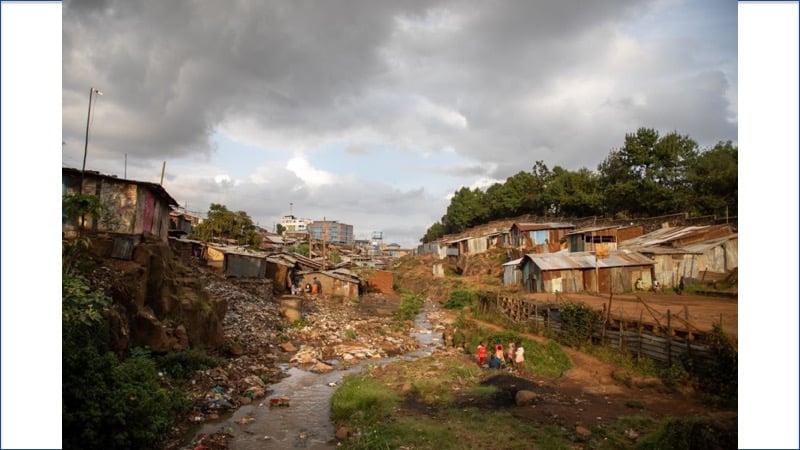
As you know, in Africa, have you seen these photos before. Money flows fail to incentivize and sometimes contradict building resilience, so finance must be more effectively directed to the most vulnerable communities aligned across levels of government. So it's crucial that investments align like this so that it is equitable. And that is, look at this. Research shows in recent years, only $1 out of every ten in climate finance reached local levels. That's the problem with central financing. We all know what goes on with corruption and people building their Swiss bank accounts.
Conclusions
So again, let businesses take care of themselves. You're going to start hearing more and more about what we're doing south of the border, working with our partner down there. It's early still, but there is change happening and it's happening one business at a time. These are all conclusions and it tells us that our mission is vital. It's what we got to do. And with that, I want to bring in Ken for the free wheeling discussion. You have this interesting green background, my friend.

Freewheeling Discussion
Ken: Because my shirt said wad. Remember when we were setting it up something my, my, my camera got all goofy, so I didn't want to look like a rolling billboard, so I figured I'd keep it. I'd keep it simple tonight and try to figure it out, figure out the problem tomorrow.
Riggs: So, you know, I was like, oh, I'm going to do this little thing on Africa. Oh, my God.
Ken: I know it's depressing.
Riggs: You know, you could spend careers in Africa alone. And so what's so important about what we're doing here is to set the example, because as I keep saying, it's not one company that's going to do it. It's going to be a movement. And the good news is, is that we that that is protected by patents. So as it rolls out, we can kind of standardize everything as we have looked at the value of Water On Demand combined with Modular Water Systems, the value of those patents under license has become paramount and that has actually become the biggest asset.
Infrastructure Issue
Ken: And what's happened here in America. So it's kind of in a way, it's a like in a way it's a polar opposite. So you're moving a billion people into cities in Africa that have strained or no infrastructure. Now, what? Right In America. You had a much smaller population in 1960 when they did this. What was the US population? 120 million, something like that. Right. And now all these people are coming out of the cities and it's now what? Right.
So it's the same problem with the opposite movement, right? No infrastructure? No. But here's the thing. And he hit the nail on the head. It's the money, stupid. And guess what? You can keep throwing money at NGOs and you can keep throwing money at charities. And it's going to still filter through the many, many hands before it gets...
Riggs: Out of $10!
Ken: Right? Right. So they shut down charities when they take like 20%. Right. So, you know, 99%, I think would fail the stress test. That's what I try to when people say, oh, you should work with this NGO and you should work with. I go, no, no, listen, the private sector will allocate money like it's theirs, because it is.
Riggs: Especially if they're not, you know, like, you know, Let's go back to the Troy, Alabama, case where the our client, who now is happy and has sold, good news is they sold their trailer park.
Ken: They did. Okay. Good.
Riggs: And it has this Rolls-Royce system. But the problem that they had was Troy, the city of Troy would not take their sewage. "Nope, we're not connecting you. You can't connect."
Ken: Not my problem.
Riggs: But were people sitting in buildings? Yes, in their mobile homes. But you're not going to take us? Nope. Can't do it. And literally, the self-sufficiency was required. We're going to see this more and more. We we just had the another mobile home Park, Excel installation that was up and running like that. So this stuff is happening,
Modular Water's Solution
Ken: Right. You get that first one done and then it's boom, boom, boom, boom. And look, here's what's interesting. The 10K, the 10K MBER...
Riggs: Membrane BioReactor.
Ken: Membrane, sorry, membrane bioreactor the housing project. That's what I want to do with my with my lot. Right. And that was before remember we came up with the idea. Well I'll put it here. I can build homes around it because there's now other builders. I believe that the, the, you know, the escape to the exurbs. I believe that it's been very limited. It's been gated via its distance to the city because of the the lack of. You know, attainable, you know, to create sewage.
I believe the exurbs now can be much more readily populated. And the there is a massive economic opportunity to bring suburbs out to exurbs. Right. People are leaving the cities. They're going to the suburbs. The people that people that are living in the suburbs are going, Who are these clowns? I'm out of here. Right. And they're and they're moving even further away. And now they can do that. And of course, right now in America, it's generally more affluent. Right? It's the more affluent that are doing that. But I see tiny home communities, things like that. These will be the gold standard in 5 to 10 years.
Riggs: Well, they're seeing it as a better financial deal already right now.
Ken: Sure.
Riggs: And you know what? What we're seeing also is that the math is the consulting engineers are looking at the math and they're going, well, this is a no brainer and it's actually creating commercial opportunity. I think a couple briefings ago, we played the Denison, Texas, where the revelation was made. That is a booming north Texas is a booming part of Texas. And literally there's no time to make infrastructure. None.
And so you have two problems. Number one is booming areas have no like here in Florida or in Texas, North Texas have no time. And then the areas that are underserved that have problems, they have no money for infrastructure. So like this is what we're seeing. For example, south of the border. We win by specifying these integrated water treatment systems right there with the factory, the housing development.
Ken: Sure. Pitch the job. Right. And by the way, it's $1 million, but you don't have to pay for it. Oh, okay. Right. You want to talk about a captive audience? It's masterful.
Riggs: Exactly.
Ken: I know math doesn't lie, Keith. Numbers don't lie.
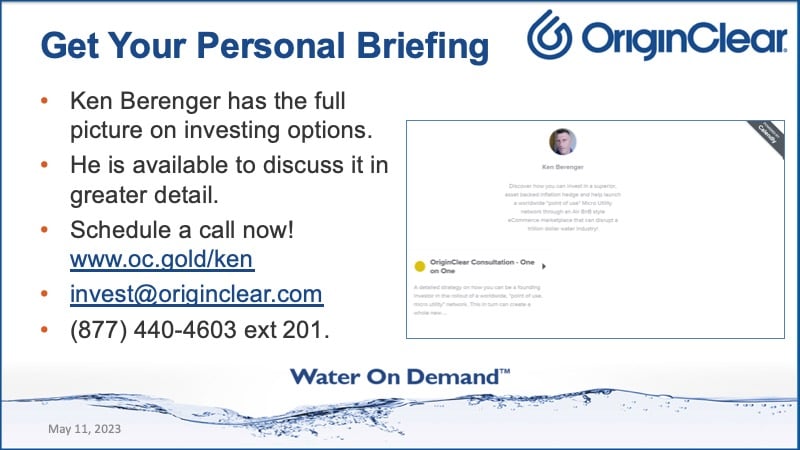
Call Ken
Riggs: All right. I wanted to do something very important here. Share a screen. Many of you see, there's a there's a Zoom survey. We like the information. The information is very helpful. So please do fill it out. Now, also Ken is there to discuss. And he's frankly become more and more and more and more, I think you, shall we say, data enabled. You've got more and more data sets to work with in your discussions with people who are looking at investing in this new space.
Ken: Sure. I think in the last 30 days, the amount of really incredibly valuable data that we've had at our disposal now is it's a godsend for me because it's able it's enabled me to really flesh out the entire picture.
Regulation A Offering (Unaccredited Investors)
And yes, to answer your question, the non-accredited offering is is currently still in place for a very short period of time. I don't know if that, I missed who asked.
Riggs: James Wright is asking.
Ken: James. Yeah, it's in place for a very short period of time.
Riggs: This is the preview. I want to make it clear the crowdfunding project is valid for a year. Because of things happening with Water On Demand that we're not free to discuss we had to establish a preview phase and that's what we're in right now. Now that preview is kind of elastic right now because of other things happening and then it will no longer be.
But it will come back. It will. The Water On Demand crowdfunding offering has a potential for coming back. I'm not saying it will because there's other factors such as the corporate structure of Water On Demand in the future, but it has a potential for coming back.
Regulation D Offering (Accredited Investors)
My best advice is if you're interested in investing as an accredited investor, do so now. Go to oc.gold/blue. And the offering circular is oc.gold/offering.
Ken: And if you're an accredited investor, go to oc.gold/ken.
Riggs: And you will get access to the the man who is made of water.
Ken: I'm Aquaman.
Riggs: All right, guys. Well, thank you very much. You know, there's no big long video tonight. There'll be more. But I thought I would get more into really diving into the scale of the problem that we have in this world with dealing with population growth and water structure and how we can let government deal with the hydrology that is the dams and the and the flow of water and also pipe. Being in fresh water. Those two things are things that have done very well by the central systems. But we've got to take responsibility for the cleanliness, keeping, keeping things clean And look.
Water, not Fintech, Space, IT or E-commerce!
Ken: And just to further the Lynch quote, I don't know if you read it or if we it appeared on screen. I was looking at some of the comments. But Lynch in his, in that piece he did, he said look, the world's first trillionaire will be an investor in water. He said not fintech, not space not IT you know. These are all...
Riggs: Not e-commerce.
Ken: These are all massive, massive businesses. And for him to say it's going to happen in water, right? Well, that was that's you know, we're kind of like, where you been? You know, we've been saying that for years. The fact that we're adding this factoring event, this factoring technology or this, what would you call it, this scaling technology of fintech to it, I believe, is really the coup de grace.
Riggs: Yes.
Ken: I think we covered what we needed to cover this week.
Riggs: You guys and gals are the very, very best. Thank you. Have another great evening. We are barreling towards an amazing summer. I can't believe we're doing such amazing work. And it is with your support. Thank you.
Ken: Good night.
Riggs: Good night, everyone.
%20250px.png?width=250&height=53&name=OriginClear%20Logo%202019%20(RGB)%20250px.png)



